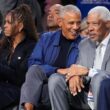A countdown clock ticks down at the election headquarters of a man named Oedipus, a candidate for high political office who has built his campaign on restoring a divided city-state now unable to talk to itself. Oh, where can we be? Somewhere close to home?
The exit polling looks good as the candidate’s crew — his wife Jocasta, daughter Antigone, sons, drivers, interlopers and campaign aides — prepare for a celebration. But there’s an eleventh-hour issue, an October surprise, if you will. The candidate suddenly becomes interested in finding out the hidden secrets of his own identity and coming clean with the voters in his pending victory speech, even when those with greater insight tell him to stop before everything unravels.
“Truth,” as it says on the sweatshirt available at the merch stand, “is a motherf—er.”
That’s the premise behind Robert Icke’s thrilling (and self-directed) new adaptation of Sophocles’ “Oedipus the King,” which opened at Broadway’s Studio 54 venue Thursday night following a hit West End run. The relentless show, which justly snagged all manner of awards in the U.K., casts the ill-fated King of Thebes as a macho, loquacious and hubristic politician. If one was looking for a real-life corollary to Mark Strong‘s leading performance among today’s aspirants, Gavin Newsom strikes me as the closest.
I mean, he would be if he had killed his dad and married his mom.
(Jocasta, said wife/mom, is played here by Academy Award nominee Lesley Manville).
Spoiler alerts don’t really apply in Greek tragedy. The original audience in 5th-century B.C. Athens all knew the plot in advance and the source play is a veritable orgy of dramatic irony, meaning the audience’s pleasure comes from consistently knowing more than the characters do about themselves and their eventual fates.
Aristotle called “Oedipus the King” the perfect tragedy and that still applies in my book, two and a half millennia later. Sophocles was the original thriller writer, and this ancient masterpiece is one of tense concision as this terrible choice inexorably and painfully leads to that bad outcome. And we all fall asunder as the all-knowing gods telegraph the way to our fate.

Icke’s work is really something: I can’t recall ever previously being as riveted at a Greek tragedy. And my admiration for his show is increased by how Icke manages to stay remarkably true to so much of the original play while turning its dialogue into contemporary speech. This doesn’t read as something based on the Greek original — it feels like the play itself, reenergized with the kind of crackling relevance all too rare on Broadway. With Shakespeare, theater artists pretty much have to stick to the original text. But since Greek tragedies were not written in English, everything has always been an adaptation, thus freeing creativity. Spectacularly so, here.
I’ve a few caveats. The show’s coda, which I will keep quiet here, doesn’t fully land. Although potent and word-perfect, Strong’s take strikes me as needing a touch more likeability. If Ickes really wanted to evoke the essential paradox of the Sophoclean original, I think he’d pay more attention to what this candidate has to do for this broken country. Classical scholars will point out that Oedipus has no choice but to seek out that which destroys him. Here, it feels like he does.

Still, few will care. I’ve always thought one of the most interesting questions in “Oedipus” to be “what does Jocasta know and when does she know it?” Manville, in a blistering and deeply complicated performance, certainly keeps one guessing, until the truth overwhelms her and the audience.
The stellar British actors Samuel Brewer, Bhasker Patel, Jordan Scowen and James Wilbraham have come over with the show. Among the U.S. newcomers, the formidable Teagle F. Bougere appears in a small but pivotal role, one that helps unlock the mystery. The spectacularly good Bougere totally creeped me out.
Moreover, nobody at my performance moved much of a muscle for the two intermission-free hours. Safer, it felt, to stay put in your seat.








